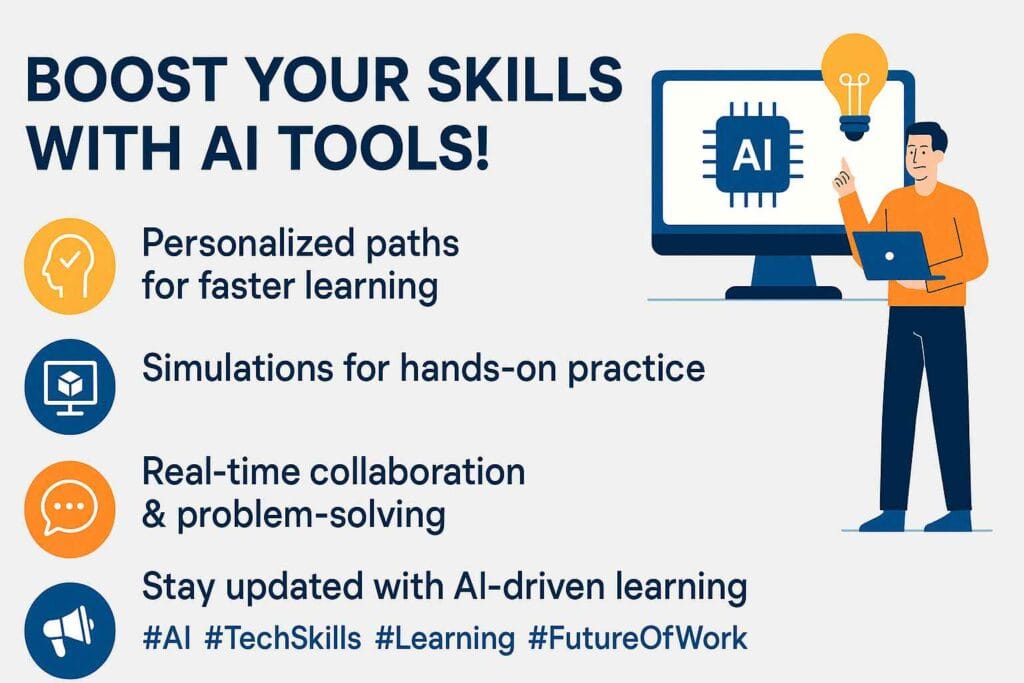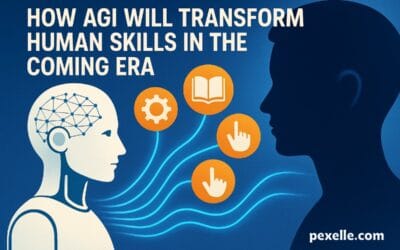Enhancing Practical and Technical Skills Using AI Tools

In today’s fast-evolving technological landscape, artificial intelligence (AI) is revolutionizing how we approach learning and skill development. AI tools, ranging from machine learning algorithms to intelligent tutoring systems, can significantly boost practical and technical skills across various industries. Here’s how:
1. Personalized Learning and Feedback
AI-driven platforms can analyze a learner’s performance and offer personalized learning paths. These platforms adapt to individual needs by suggesting relevant resources, exercises, and tutorials. For example, platforms like Coursera or Udemy use AI to recommend courses based on a user’s learning history and preferences. This ability to tailor the learning process ensures a more effective and focused skill-building experience.
2. Simulations and Virtual Environments
For technical skills that require hands-on experience, such as programming, engineering, or medical procedures, AI-powered simulations offer invaluable practice. Virtual labs, digital twins, and simulated environments allow users to practice without the risks associated with real-world execution. AI models can simulate complex systems and provide real-time feedback, offering learners the opportunity to experiment and refine their skills.
3. Automated Code Review and Debugging
In software development, tools like GitHub Copilot or DeepCode use AI to assist with writing code, debugging, and reviewing. These tools can highlight potential issues, suggest improvements, and provide insights into best practices. Developers can use AI to accelerate coding, optimize performance, and reduce errors, which ultimately enhances their technical abilities.
4. Real-Time Collaboration and Problem Solving
AI tools facilitate real-time collaboration between experts and learners. Platforms like Google Docs, Microsoft Teams, and Slack use AI to assist in document editing, scheduling, and communication. By enabling seamless communication and project management, these tools help users enhance their teamwork and technical skills in a collaborative environment. Additionally, AI-powered chatbots and assistants can quickly provide answers to technical queries, helping users solve problems faster.
5. AI-Powered Testing and Evaluation
AI is also transforming how we evaluate and test technical skills. Tools like HackerRank or LeetCode use AI to design coding challenges that test specific skill sets, enabling developers to improve their problem-solving abilities. AI systems also evaluate performance, providing detailed insights and suggestions for improvement. These platforms can analyze the learner’s problem-solving approach and suggest more efficient ways to tackle tasks, boosting both technical and critical thinking skills.
6. Adaptive Learning Systems
AI-based adaptive learning systems are designed to adjust the level of difficulty based on the learner’s progress. These systems ensure that users are constantly challenged without feeling overwhelmed. For example, AI can detect when a learner is struggling with a specific concept and automatically provide supplementary resources or adjust the difficulty level to suit the learner’s pace.
7. Data-Driven Insights and Decision Making
For professionals in data analytics, finance, and other decision-making fields, AI tools can provide powerful insights and improve decision-making skills. AI systems can analyze large datasets, detect patterns, and generate actionable insights that would be difficult for humans to identify manually. These insights help users make better, data-driven decisions, enhancing their technical abilities in fields like data science, business analytics, and more.
8. Continuous Learning and Upgradation
AI tools also play a critical role in promoting continuous learning and skill development. By automating certain processes and keeping track of industry trends, AI helps users stay up-to-date with the latest developments. AI can recommend new certifications, online courses, and webinars that align with a user’s career goals, ensuring they remain competitive in their field.
9. Voice Assistants for Technical Support
Voice-enabled AI assistants like Siri, Alexa, and Google Assistant are not just for everyday tasks. They can also help with technical queries, providing instant answers or guiding users through complex troubleshooting processes. These tools assist in enhancing problem-solving abilities by allowing users to interact hands-free, saving time and improving workflow efficiency.
10. Integration with Internet of Things (IoT)
AI tools integrated with IoT devices enable users to monitor and control smart devices in real time. For technical professionals, this provides hands-on experience with real-world applications of AI and IoT, helping them build skills in automation, connectivity, and systems management.
Conclusion
AI tools are rapidly transforming how individuals develop practical and technical skills. By offering personalized learning paths, hands-on practice opportunities, real-time collaboration, and insightful feedback, AI accelerates skill acquisition and enhances proficiency. As technology continues to evolve, leveraging AI tools will be essential for anyone looking to stay ahead in the increasingly tech-driven job market.
Source : Medium.com



